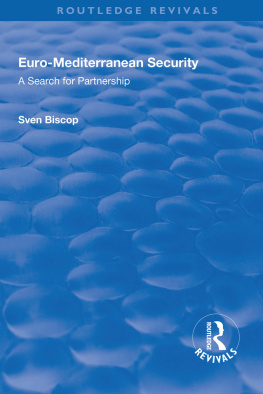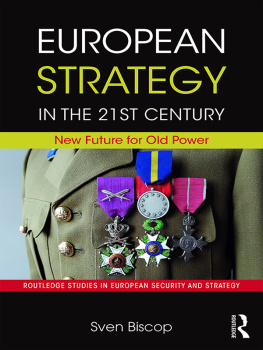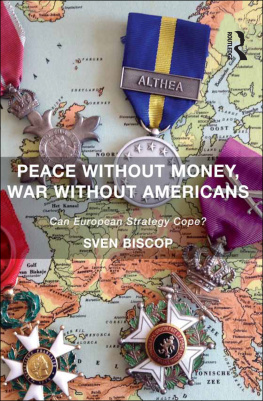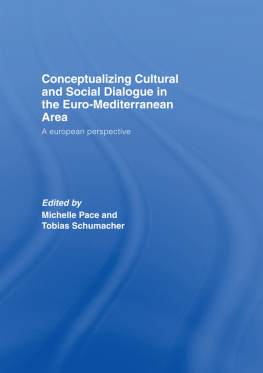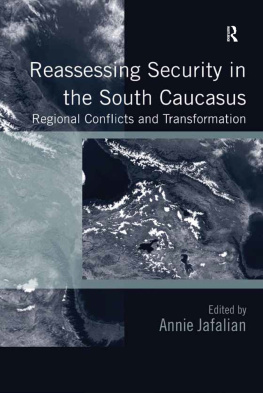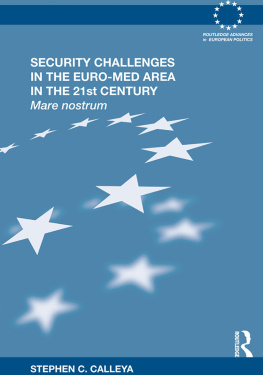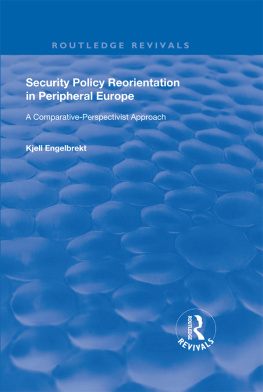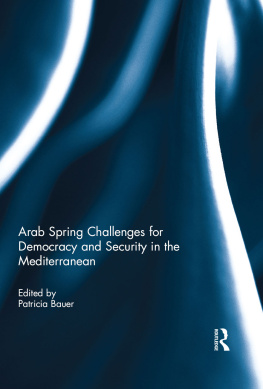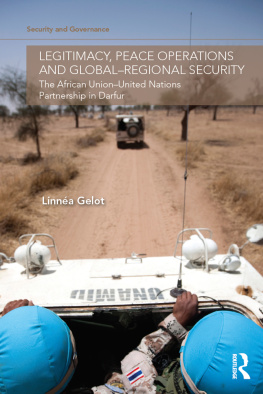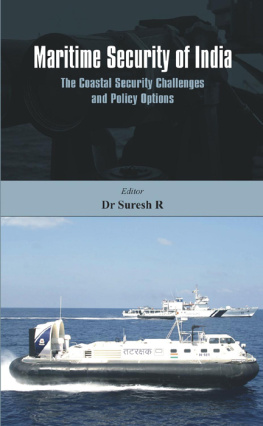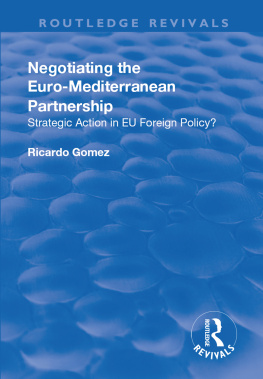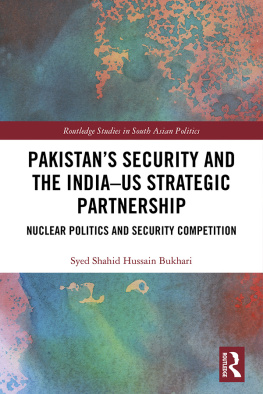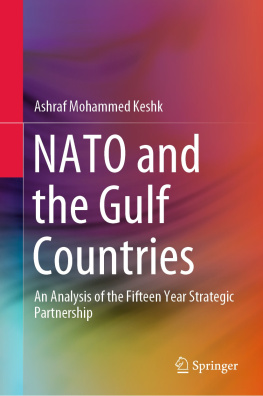EURO-MEDITERRANEAN SECURITY
The International Political Economy of New Regionalisms Series
The International Politicai Economy of New Regionalisms Series presents innovative analyses of a range of novel regional relations and institutions. Going beyond established, formal, interstate economic organizations, this essential series provides informed interdisciplinary and international research and debate about myriad heterogeneous intermediate level interactions.
Reflective of its cosmopolitan and creative orientation, this series is developed by an international editorial team of established and emerging scholars in both the South and North. It reinforces ongoing networks of analysts in both academia and think-tanks as well as international agencies concerned with micro-, meso-and macro-level regionalisme.
Editorial Board
Timothy M. Shaw, University of London, UK
Isidro Morales, Universidad de las Amricas - Puebla, Mexico
Maria Nzomo, University of Nairobi, Kenya
Nicola Phillips, University of Manchester, UK
Johan Saravanamuttu, Science University of Malaysia, Malaysia
Fredrik Sderbaum, Gteborgs Universitet, Sweden
Other Titles in the Series
Reconfigured Sovereignty
Thomas L. Ilgen
The New Regionalism in Africa
J. Andrew Grant and Fredrik Sderbaum
Comparative Regional Integration
Finn Laursen
Transnational Democracy in Critical and Comparative Perspective
Bruce Morrison
Euro-Mediterranean Security
A Search for Partnership
Sven Biscop
The Royal Institute for International Relations, Belgium
First published 2003 by Ashgate Publishing
Reissued 2018 by Routledge
2 Park Square, Milton Park, Abingdon, Oxon OX14 4RN
711 Third Avenue, New York, NY 10017, USA
Routledge is an imprint of the Taylor & Francis Group, an informa business
Copyright Sven Biscop 2003
Sven Biscop has asserted his right under the Copyright, Designs and Patents Act, 1988, to be identified as author of this work.
All rights reserved. No part of this book may be reprinted or reproduced or utilised in any form or by any electronic, mechanical, or other means, now known or hereafter invented, including photocopying and recording, or in any information storage or retrieval system, without permission in writing from the publishers.
Notice:
Product or corporate names may be trademarks or registered trademarks, and are used only for identification and explanation without intent to infringe.
Publisher's Note
The publisher has gone to great lengths to ensure the quality of this reptint but points out that some imperfections in the original copies may be apparent.
Disclaimer
The publisher has made every effort to trace copyright holders and welcomes correspondence from those they have been unable to contact.
A Library of Congress record exists under LC control number: 2003052051
ISBN 13: 978-1-138-71398-7 (hbk)
ISBN 13: 978-1-315-19798-2 (ebk)
The European Union is developing into a significant international actor in the field of security. In line with the overall objectives of the Common Foreign and Security Policy (CFSP) as included in the Treaty on European Union, the EU has now provided for itself an important role in the field of conflict prevention and crisis management. If the ambitious objectives regarding the creation of European capacities are achieved, inter alia, through the establishment of a military component for the CFSP, the European Security and Defence Policy (ESDP), the Union should emerge as a powerful international actor, possessing the whole range of policy instruments, from diplomatic and economic to military, to implement its CFSP.
Europe's ambitions to play a role in the field of international security are a result of fairly recent developments on the European continent. The end of the Cold War also saw the end of the stable and predictable security situation which, at least in Europe, had reigned for several decades. A new volatile security environment emerged, with the EU as a bloc of peace and stability amidst countries in the process of fundamental transformations. The Union's attention was immediately focussed on the Central and Eastern European countries which, after decades of seclusion, sought integration in the Western worid. The EU acted as an 'exporter of stability': it provided, and still does, massive support for these countries' transition to democracy and the market economy and, hopefully, the welfare state, with membership of the Union as the ultimate objective. The eruption of a bloody conflict in Former Yugoslavia and the Union's inability to deal with it efficaciously, were a sad demonstration of the absolute need for Europe to develop a foreign and security policy suited to this new post-Cold War environment. The absence of structures to prevent or resolve the successive crises on the Balkans, the US' reluctance to intervene in what Washington deemed to be European problems, and the performance gap between European and American foreign and security policy very gradually convinced all Member States of the EU of the necessity to create the CFSP and later the ESDP. Several Member States, the Scandinavian countries e.g., are still hesitant regarding integration in these fields and both the CFSP and the ESDP yet retain an intergovernmental character, but they are fully developing.
Driven by the concerns of its Southern Member States, the EU gradually began to devote more attention to its Southern periphery as well. During the Cold War the focus of security policy had been continental Europe. The Mediterranean was merely a side-show to this central stage of East-West confrontation and Western security policy towards the region was completely dominated by the US. Now security in the Mediterranean has attained a higher profile and new security issues have become apparent. The Union became aware of its important interests in the area, hence the need for a security policy towards the region, if only because of geographic proximity. This prompted the EU in 1995 to launch the Euro-Mediterranean Partnership (EMP) with twelve Mediterranean countries. The Partnership includes an ambitious security dimension. At the same time as developing a new role in the fields of conflict prevention and crisis management, the Union is also manifesting itself in a region in which until a few years ago it played a very limited part, certainly in the politico-military field. One should not forget though that historically Europe has always been very much present in the Mediterranean, even to the point of dominating it. Until the Second World War France and the UK and, to a lesser extent, Spain and Italy, controlled most of the countries that are now the Union's Mediterranean partners and their influence based on that legacy is important still. In this sense the Union is only renewing its participation in the dynamics of the Mediterranean, but this time its policies are founded on a spirit of partnership and cooperation instead of imperialist designs. The Mediterranean today is a very unstable area however, a region troubled by persisting conflicts and disputes. The conflict in the Middle East is of course the most prominent of these, but Greek-Turkish tensions, the Cyprus issue, the violence in Algeria and the matter of the Western Sahara are equally threatening to peace and stability. While the Mediterranean during several periods in history functioned as a bridge, it is nowadays more often perceived as the frontier line between the West and the Arab world. More often than not the latter is seen as a source of security threats. A closer look however reveals interests which are common to both shores of the Mediterranean. The cooperative approach to security advocated by the EMP is an attempt to do away with the idea of the Mediterranean as a frontier and to make it once again into a crossroads of ideas.

